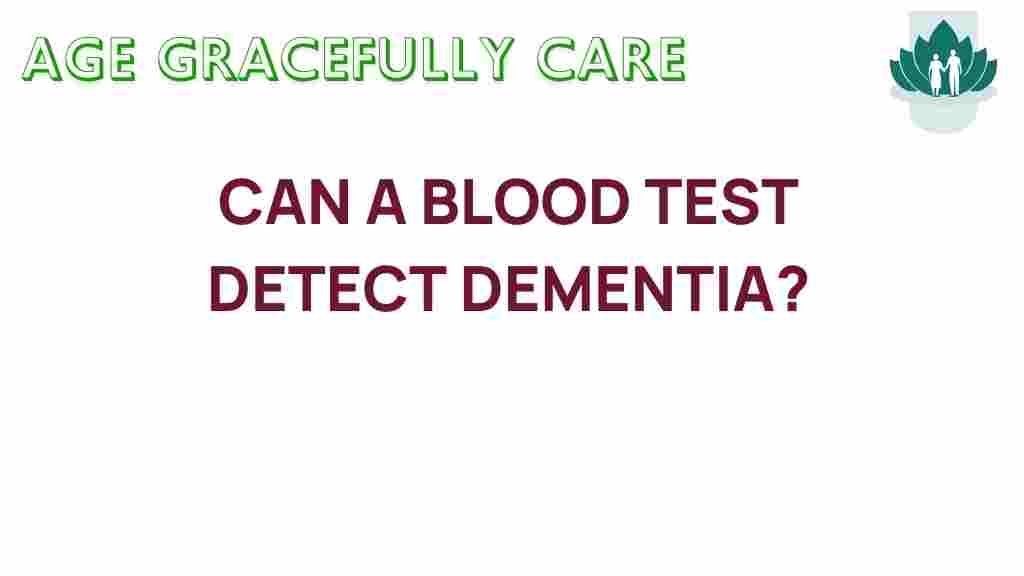Can a Blood Test Reveal the Early Signs of Dementia?
Dementia is a complex and often misunderstood condition that affects millions of individuals worldwide. As the population ages, the prevalence of dementia, particularly Alzheimer’s disease, is on the rise. Early detection is crucial for managing symptoms and improving the quality of life for those affected. Recent advancements in medical research suggest that a simple blood test might be key to unlocking the mysteries of early detection for dementia. In this article, we will explore how blood tests can reveal early signs of cognitive decline, the biomarkers involved, and the potential for health innovation in dementia diagnosis.
Understanding Dementia and Its Impact
Dementia is an umbrella term that encompasses a range of cognitive disorders, including Alzheimer’s disease, vascular dementia, and Lewy body dementia. Symptoms often include:
- Memory loss
- Difficulty concentrating
- Challenges with problem-solving
- Language difficulties
- Changes in mood and behavior
As dementia progresses, it can significantly impact daily living and the ability to perform routine tasks. Understanding the early signs is essential for timely intervention and care.
The Role of Early Detection in Dementia Management
Early detection of dementia can lead to better outcomes for patients. It allows individuals to:
- Plan for the future
- Participate in clinical trials
- Access medications that may slow cognitive decline
- Engage family members and caregivers in discussions about care
However, traditional methods of diagnosis often rely on cognitive tests, which may not detect changes until significant damage has occurred. This is where innovative medical research into blood tests comes into play.
How Can a Blood Test Help in Early Detection of Dementia?
Recent studies have focused on identifying specific biomarkers in the blood that are associated with dementia. Biomarkers are measurable indicators of a biological condition, and their discovery is pivotal in the field of health innovation.
Researchers are exploring various types of biomarkers that can indicate the presence of neurodegenerative diseases:
- Protein Levels: Abnormal levels of proteins like amyloid-beta and tau are linked to Alzheimer’s disease.
- Inflammatory Markers: Chronic inflammation in the body has been associated with cognitive decline.
- Metabolic Indicators: Changes in metabolism and specific lipids in the blood may signal the onset of dementia.
The Step-by-Step Process of Blood Testing for Dementia
Here’s how the process typically unfolds when it comes to using a blood test for early detection of dementia:
- Initial Consultation: If a patient exhibits symptoms of cognitive decline, they should consult a healthcare professional.
- Comprehensive Evaluation: The doctor may perform cognitive assessments and recommend further testing.
- Blood Sample Collection: A simple blood test is conducted to analyze biomarkers associated with dementia.
- Laboratory Analysis: The blood sample is analyzed in a laboratory for the presence of specific biomarkers.
- Results Interpretation: The healthcare provider discusses the results and potential next steps with the patient.
Recent Advances in Medical Research
Significant strides have been made in medical research regarding blood tests for dementia. Some key findings include:
- Studies have shown that elevated levels of amyloid-beta in the blood correlate with brain amyloid deposits, a hallmark of Alzheimer’s disease.
- Researchers at major institutions are developing tests that can detect multiple biomarkers simultaneously, enhancing diagnostic accuracy.
- Clinical trials are underway to validate the effectiveness of these blood tests in various populations.
For more detailed information on the latest research, you can visit Alzheimer’s Association Research.
Troubleshooting Common Concerns
Many people may have concerns or questions regarding blood tests for dementia. Here are some common issues and solutions:
- Concern: Are blood tests reliable for diagnosing dementia?
- Solution: While not yet definitive, emerging research shows promising results in identifying biomarkers linked to dementia.
- Concern: Will a blood test replace traditional cognitive assessments?
- Solution: Blood tests are intended to complement cognitive assessments, providing a more comprehensive evaluation.
- Concern: How can I prepare for a blood test?
- Solution: Follow any specific instructions given by your healthcare provider, such as fasting before the test.
The Future of Blood Testing in Dementia Diagnosis
The future of blood testing for dementia looks promising. With ongoing advancements in medical research and technology, blood tests may become a standard part of the diagnostic process. Some potential developments include:
- Enhanced Biomarker Discovery: Continued research may uncover additional biomarkers that can improve diagnostic accuracy.
- Point-of-Care Testing: Development of rapid testing methods that can be performed in a doctor’s office.
- Integration with AI: Utilizing artificial intelligence to analyze blood test results and predict cognitive decline.
These innovations could transform how we approach dementia, making early detection more accessible and effective.
Conclusion
In conclusion, the potential for blood tests to reveal the early signs of dementia represents a significant advancement in the field of medical research. By identifying biomarkers associated with Alzheimer’s disease and other forms of dementia, these tests could facilitate early detection and intervention, ultimately improving patient outcomes.
As we continue to explore the intricacies of cognitive decline, it is essential to stay informed about health innovations in this area. The integration of blood tests could significantly change the landscape of dementia diagnosis and management. For those concerned about dementia, discussing blood testing options with a healthcare provider could be a vital step towards understanding and addressing cognitive health.
For more resources on dementia and its early signs, consult this comprehensive guide.
This article is in the category Health and created by AgeGracefullyCare Team
